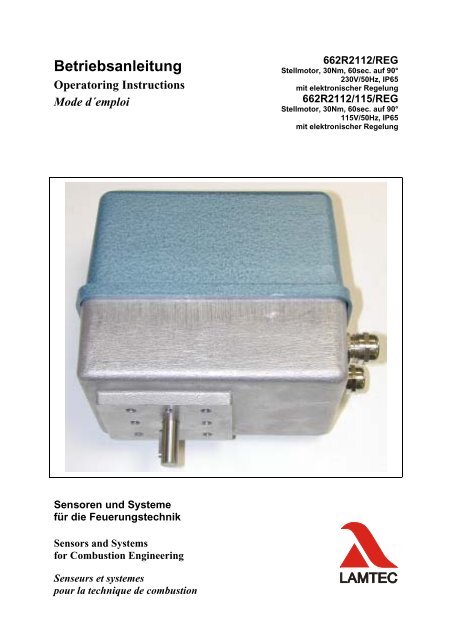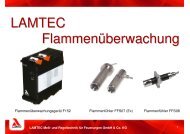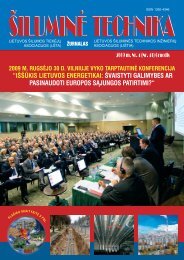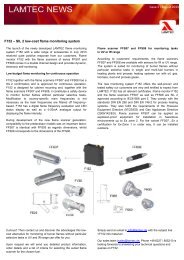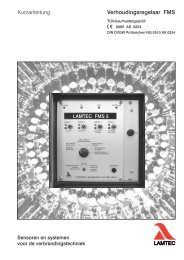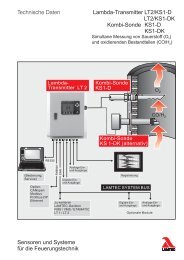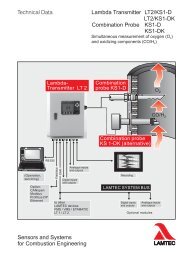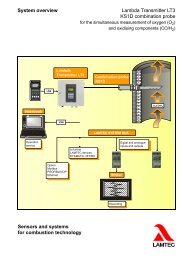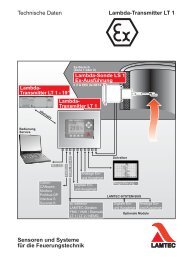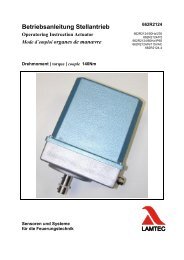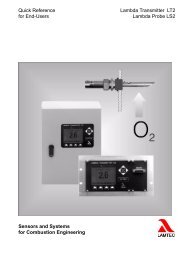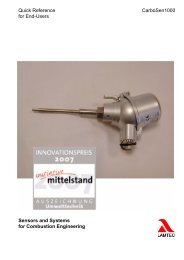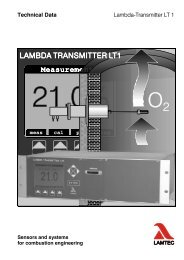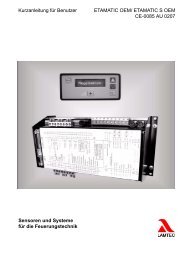Sicherheitshinweise - lamtec
Sicherheitshinweise - lamtec
Sicherheitshinweise - lamtec
You also want an ePaper? Increase the reach of your titles
YUMPU automatically turns print PDFs into web optimized ePapers that Google loves.
Betriebsanleitung<br />
Operatoring Instructions<br />
Mode d´emploi<br />
662R2112/REG<br />
Stellmotor, 30Nm, 60sec. auf 90°<br />
230V/50Hz, IP65<br />
mit elektronischer Regelung<br />
662R2112/115/REG<br />
Stellmotor, 30Nm, 60sec. auf 90°<br />
115V/50Hz, IP65<br />
mit elektronischer Regelung<br />
Sensoren und Systeme<br />
für die Feuerungstechnik<br />
Sensors and Systems<br />
for Combustion Engineering<br />
Senseurs et systemes<br />
pour la technique de combustion
Inhaltsverzeichnis Table of Content table des matières<br />
Thema<br />
Theme | thème<br />
Kapitel<br />
Chapter | chapitre<br />
Allgemeine Hinweise<br />
General References | indications générales<br />
1<br />
<strong>Sicherheitshinweise</strong><br />
Safety References | indications de sécurité<br />
2<br />
Einstellen der Endlagen<br />
Adjust the End Positions | ajuster les situations finales<br />
3<br />
Elektrischer Anschluss<br />
Electrical Connection | raccordement électrique<br />
4<br />
Stromlaufplan<br />
Circuit Diagram| Schéma de circuit<br />
5<br />
Maßzeichnung<br />
Dimensional Drawing | dessin de mesure<br />
6<br />
Technische Daten<br />
Technical Data | data technique<br />
7<br />
EG-Konformitätserklärung<br />
EC Declaration of Confirmity | Déclaration de conformité CE<br />
8
Allgemeine Hinweise General References indications générales<br />
Allgemeine Hinweise<br />
Gültigkeit dieser Anleitung:<br />
Validity of this Manual:<br />
Domaine d’application<br />
Diese Anleitung gilt für Stellmotor Fabrikat Lamtec Typ 662R2112/REG<br />
und Typ 662R2112/115/REG<br />
Diese Motoren sind ausschließlich zum Antrieb von Stellorganen von<br />
Feuerungsanlagen in Verbindung mit Lamtec Feuerungs und Verbund-<br />
Management Systemen Typ Etamatic, FMS oder VMS zugelassen.<br />
Die Art der Rückführung ist formschlüssig ausgeführt. Die Motoren sind<br />
als Stellorgane für Etamatic, VMS und FMS zugelassen und entsprechen<br />
den Anforderungen an Stellmotore für diese Geräte.<br />
This manual applies to control drives made by Lamtec type<br />
662R2112/REG and Typ 662R2112/115/REG.<br />
These control drives are exclusively certified to the drive of<br />
regulating units of combustins plants in connection with<br />
LAMTEC’s firing and compound management systems type<br />
ETAMATIC, FMS and VMS.<br />
The kind of the feedback is positively implemented. The control<br />
drives are certified for ETAMATIC, VMS and FMS and<br />
corresponds to the requirements to control drives for these devices.<br />
Ce manuel est destiné pour les servo-moteurs du fabriquant<br />
LAMTEC et de type 662R2112/REG et Typ 662R2112/115 /REG.<br />
L’utilisation de ces moteurs est autorisé pour le positionnement des<br />
chapets d’une chaudière indistruelle et dovient uniquement<br />
êtreraccordé aux automates de commande de type ETAMATIC,<br />
FMS, VMS.<br />
Les caractéristiques de la recopie sont invariantes. Ces moteurs<br />
sont destinés pourêtre piloter par les automates ETAMATIC, VMS<br />
et FMS et présente les caractéristiques requis pour la<br />
positionnement des clapets pour ces appareils.<br />
Kap. 1
Allgemeine Hinweise General References indications générales<br />
Geräte- Sicherheitsgesetz beachten<br />
Das Geräte-Sicherheitsgesetz schreibt vor:<br />
Gebrauchsanleitung beachten!<br />
Nur nach der hier vorliegenden technischen Dokumentation (Druckschrift<br />
Nr. DLT662R2112-REG) vorgehen.<br />
Geräte nur für die beschriebene Verwendung benutzen.<br />
Bedienung nur durch geschultes Personal. Das Gerät darf nur von<br />
Personen bedient und gewartet werden, die von ihrem Kenntnisstand und<br />
ihrer Ausbildung dazu befähigt sind.<br />
Die Haftung für die Funktion des Gerätes geht in jedem Fall auf den<br />
Eigentümer oder Betreiber über.<br />
Die Haftung für die Funktion des Gerätes geht in jedem Fall auf den<br />
Eigentümer oder Betreiber über soweit das Gerät von Personen, die nicht<br />
über die erforderlichen Kenntnisse verfügen, unsachgemäß betrieben,<br />
gewartet oder instandgesetzt wird oder wenn eine Handhabung erfolgt,<br />
die nicht der bestimmungsgemäßen Verwendung entspricht.<br />
Für Schäden, die durch die Nichtbeachtung der vorstehenden Hinweise<br />
eintreten, haftet die LAMTEC GmbH & Co KG nicht. Gewährleistungsund<br />
Haftungsbedingungen der Verkaufs- und Lieferbedingungen der<br />
LAMTEC GmbH & Co KG werden durch vorstehende Hinweise nicht<br />
erweitert.<br />
Soweit auf Gesetze, Verordnungen und Normen hingewiesen wird, ist die<br />
Rechtsordnung der Bundesrepublik Deutschland zu Grunde gelegt.<br />
Kap. 1
Allgemeine Hinweise General References indications générales<br />
Complying with the Requirements of Equipment Safety Law:<br />
Follow the instructions!<br />
This equipment is to be used only in accordance with these<br />
operating instructions (Document No. DLT662R2112-REG).<br />
The equipment may only be used in the manner described<br />
Operation only by trained personnel. The equipment may only be<br />
operated and serviced by persons who are qualified to do so on the<br />
basis of their expertise and training.<br />
Liability for the functioning of the equipment transferred to<br />
the owner or operator<br />
Liability for the functioning of the equipment shall in all cases be<br />
transferred to the owner or operator if the equipment is improperly<br />
operated, serviced or repaired by persons who do not possess the<br />
necessary expertise, or if the equipment is handled in a manner<br />
other than that prescribed.<br />
LAMTEC GmbH & Co KG will not accept liability for damages<br />
arising from failure to comply with the above instructions. The<br />
above instructions do not extend the warranty and liability<br />
conditions of the Conditions of Sale and Supply of LAMTEC<br />
GmbH & Co KG.<br />
Where reference is made to laws, regulations or standards, these are<br />
based on the legal system of the Federal Republic of Germany.<br />
Kap. 1
Allgemeine Hinweise General References indications générales<br />
Protection et sécurité de l’appareil<br />
La loi de protection de sécurité de l’appareil stipule :<br />
Prendre en considération les indications de la notice d’utilisation seule les<br />
documentations No DLT 662R21112-REG sont valable<br />
Utiliser seulement l’appareil pour les applications décrites dans la<br />
manuel.<br />
Les détenteurs et utilisateurs de l’appareil sont tenues responsable des<br />
fonctions attribués à l’appareil.<br />
La responsabilité des fonctions de l’appareil sont , dans tous les<br />
cas, attribués à l’utilisateur<br />
La responsabilité des fonctions de l’appareil sont , dans tous les cas,<br />
attribués à l’utilisateur ou propriétaire de l’appareil indépendamment que<br />
les utilisateurs ne disposent les – connaissances requises ou que<br />
l’utilisation ne soit pas conforme à la notice ou que l’appareil ne soit pas<br />
correctement utiliser.<br />
La société LAMTEC GmbH & CO KG dégage toutes respnsibilités pour<br />
les dommages causés par le non respect des indications de la notice<br />
d’utilisation.<br />
Les garanties de ventes et de livraisons se sont plus valable lors de tous<br />
non-respect des indications d’utilisation.<br />
Dans la limite de désignation des lois et normes, les droits de la<br />
République fédérale Allemande seront appliquées.<br />
Kap. 1
<strong>Sicherheitshinweise</strong> für<br />
die Montage<br />
Safety References for the<br />
Assembly<br />
indications de sécurité<br />
d'assemblages<br />
<strong>Sicherheitshinweise</strong> für die Montage<br />
Je nach dem, zu welchem Zeitpunkt und unter welchen<br />
Umgebungsbedingungen Sie den Stellantrieb montieren, sind spezielle<br />
Sicherheitsaspekte zu berücksichtigen.<br />
• Die Montage und Inbetriebnahme des Antriebes darf nur durch<br />
qualifizierte Fachkräfte erfolgen, die sowohl über fundierte<br />
mechanische als auch elektrische Kenntnisse verfügen!<br />
WARNUNG<br />
Vor einer Montage oder Reparatur eines Stellantriebes sind alle<br />
betroffenen Geräte/Maschinen/Anlagen abzuschalten und<br />
gegebenenfalls vom Netz zu trennen!<br />
• Überzeugen Sie sich, das pneumatische oder hydraulische<br />
Geräte/Maschinen/Anlagen vor der Montage bzw. Reparatur<br />
drucklos sind oder veranlassen Sie dies. Sollte dies aus<br />
verschiedenen Gründen nicht möglich sein, treffen Sie<br />
Sicherheitsvorkehrungen, das Schäden für Menschen, Umwelt<br />
und Geräte/Maschinen/Anlagen ausgeschlossen werden können!<br />
• Die Verbindung Abtriebswelle Motor muss formschlüssig<br />
erfolgen. Die Verbindung/ Verstiftung muss so dimensioniert<br />
sein, dass bei einer Blockierung des Stellorgans auch der Motor<br />
blockiert. Ein Abscheren, Abreißen der Verbindung muss auch<br />
bei maximalem Drehmoment des Motors ausgeschlossen sein.<br />
Hierbei ist eine Sicherheitsreserve von mind. 50%<br />
einzukalkulieren<br />
• Sichern Sie Ihre Arbeitsstätte ab und stellen Sie sicher, dass die<br />
Geräte/Maschinen/Anlagen, an denen Sie arbeiten, nicht<br />
unbeabsichtigt in Betrieb genommen werden können!<br />
• Bei der Montage oder Reparatur eines Stellantriebes sind die<br />
jeweils zutreffenden berufsgenossenschaftlichen Sicherheitsund<br />
Unfallverhütungsvorschriften zu berücksichtigen!<br />
• Überzeugen sie sich vor der Montage/Reparatur über korrekte<br />
Funktion der Sicherheitseinrichtungen!<br />
WARNUNG<br />
Bei Austausch eines Potentiometers oder Endschalters muss die<br />
Auswirkung auf die Feuerungseinstellung überprüft werden!<br />
Gegebenenfalls muss die Feuerungseinstellung angepasst werden<br />
Kap. 2
<strong>Sicherheitshinweise</strong> für<br />
die Montage<br />
Safety References for the<br />
Assembly<br />
indications de sécurité<br />
d'assemblages<br />
Safety References for the Assembly<br />
Depending upon that, at which time and under which site conditions<br />
you install the control drive, special safety aspects are to consider.<br />
• The assembly and start-up of the drive may take place only via<br />
qualified specialists, who have both founded mechanical and<br />
electrical knowledge!·<br />
WARNING<br />
Before an assembly or a repair of a control drive all equipment/<br />
machine/plants concerned are to be switched off and if necessary<br />
to be separated from the mains supplement<br />
WARNING<br />
Before switching off device/machine/plants, it is to be examined<br />
compellingly whether switching off cannot exhibit danger<br />
moments. In particular this applies to proceed-technical plants!·<br />
• Disconnections are only after previous consultation with the<br />
operating manager, shift leaders or safety engineer to accomplish!<br />
• Disturbances are immediate to announce the operating manager,<br />
shift leader or safety engineer for danger warning!·<br />
• Convince, that pneumatic or hydraulic equipment/machine/plants<br />
before the assembly and/or repair are pressure-free or arrange this.<br />
If this should not be possible for different reasons, meet safety<br />
precautions, which provided damage for humans, environment and<br />
equipment/machine/plants!<br />
• Secure it your working place and guarantee it, that the<br />
equipment/machine/plants, on which you work, can’t be taken<br />
unintentionally starting!·<br />
• When assembling or repair of a control drive, in each case the<br />
applicable safety rules for the prevention of accidents of the<br />
professional association are to be considered!·<br />
• Convince yourselves before the assembly/repair over correct<br />
function of the safety devices!<br />
Kap. 2
<strong>Sicherheitshinweise</strong> für<br />
die Montage<br />
Safety References for the<br />
Assembly<br />
indications de sécurité<br />
d'assemblages<br />
Indications de sécurité d'assemblages<br />
Selon cela, à quel moment et sous quelles conditions<br />
d'environnement vous installez l'organe de manœuvre, des aspects<br />
de sécurité spéciaux doivent être pris en considération .<br />
• L'assemblage et le démarrage de la commande ne peuvent avoir<br />
lieu que par la main-d’œuvre qualifiée qui dispose des<br />
connaissances mécaniques aussi bien qu'électriques fondées!·<br />
AVERTISSEMENT<br />
Avant un assemblage ou une réparation d'un organe de manœuvre<br />
tous doivent être mis hors circuit installations d'appareil<br />
concernées et séparés éventuellement approvisionnement de<br />
réseau!·<br />
AVERTISSEMENT<br />
Avant de mettre hors circuit des installations d'appareil, il faut<br />
examiner impérativement si mettre ne peut pas montrer de<br />
moments de danger. Cela vaut en particulier pour la douceur<br />
d'opération!<br />
• Des coupures ne doivent être mises en oeuvre que conformément à<br />
entretien précédent avec le directeur de couche, ou l'ingénieur de<br />
sécurité!·<br />
• Pour une prévention des dangers sont des dérangements immédiats<br />
d'annoncer des directeurs de couche ou l'ingénieur de sécurité !·<br />
• Vous convainquez qui des installations d'appareil pneumatiques ou<br />
hydrauliques avant l'assemblage et/ou la réparation sont sans<br />
pression ou vous provoquez cela. Si cela ne devait pas être possible<br />
pour différentes raisons, vous rencontrez des mesures de sécurité,<br />
dommages pour des hommes, environnement et des installations<br />
d'appareil être exclu pouvez!·<br />
• Assurez et garantissez votre lieu de travail ils que les installations<br />
d'appareil, auquel vous travaillez, ne peuvent pas être mises en<br />
service involontairement!<br />
• Avec l'assemblage ou la réparation d'un organe de manœuvre, les<br />
règlements de prévoyance contre les accidents et de sécurité<br />
professionnels respectivement justes doivent être pris en<br />
considération !·<br />
• Vous convainquez avant l'assemblage/réparation sur la fonction<br />
correcte des dispositifs de sécurité!<br />
Kap. 2
<strong>Sicherheitshinweise</strong> für<br />
die Einstellungen<br />
Safety References for the<br />
Attitudes<br />
indications de sécurité<br />
de réglages<br />
<strong>Sicherheitshinweise</strong> für die Einstellungen<br />
WARNUNG<br />
Stellen Sie sicher, dass durch die Inbetriebnahme bzw. durch die<br />
Testeinstellungen keine Gefahr für Mensch, Umwelt und Geräte/<br />
Maschinen/Anlagen entstehen kann!<br />
WARNUNG<br />
Vergewissern Sie sich, dass die volle Bewegungsfreiheit der<br />
Stellantriebe gewährleistet ist und für das Personal keine<br />
Quetschgefahr besteht! Errichten Sie gegebenenfalls<br />
Absperrungen!<br />
WARNUNG<br />
Bei der Arbeit an geöffneten und betriebsbereiten Stellantrieben<br />
besteht die Gefahr, das spannungsführende Teile (24/115/230/400V<br />
AC~) berührt werden können! Das Montagepersonal sollte deshalb<br />
entsprechend qualifiziert sein und sich dieser potentiellen Gefahr<br />
bewusst sein!<br />
• Sichern Sie den Arbeitsbereich der Geräte/Maschine/Anlagen gegen<br />
unbeabsichtigte In- oder Außerbetriebnahme ab!<br />
• Überprüfen Sie nach Abschluss der Einstellungen, ob die elektrischen<br />
Signale des Stellantriebe, insbesondere die Stellungsrückmeldung<br />
(optional), mit der mechanischen Stellung des Antriebes übereinstimmt!<br />
Dies gilt insbesondere für die Endlagen!<br />
• Abschließend überprüfen Sie die Funktion eventueller<br />
Sicherheitseinrichtungen auf Fehlerfreiheit!<br />
• Stellen Sie vor Inbetriebnahme sicher, dass die Endschalter derart<br />
justiert sind, dass das Stellorgan nicht auf mechanischen Anschlag läuft.<br />
Dies kann wegen erhöhter Stromaufnahme das Ansteuerorgan oder den<br />
Motor beschädigen.<br />
Kap. 2
<strong>Sicherheitshinweise</strong> für<br />
die Einstellungen<br />
Safety References for the<br />
Attitudes<br />
indications de sécurité<br />
de réglages<br />
Safety References for the Attitudes<br />
WARNING<br />
Guarantee that from start-up and/or from the test attitudes no<br />
danger for humans, environment and equipment/machine/plants<br />
can result!··<br />
WARNING<br />
Make sure that the full freedom of movement of the control drives<br />
is ensured and exists for the personnel no squeezing danger!<br />
Establish to shut-off positions if necessary!·<br />
WARNING<br />
With the work on opened and ready for use control drives exists<br />
the danger, which live dividing (24/115/230/400V AC~) can be<br />
affected! The assembly personnel should be accordingly qualified<br />
therefore and be conscious this potential danger!<br />
• Secure the work area of the equipment/machine/plants against<br />
unintentional in or putting out of operation!·<br />
• Examine after conclusion of the attitudes whether the electrical<br />
signals control drives, in particular the position feedback (optional),<br />
with which mechanical position of the drive agrees! This applies in<br />
particular to the end positions!·<br />
• Finally you examine the function of possible safety devices for<br />
accuracy!<br />
Kap. 2
<strong>Sicherheitshinweise</strong> für<br />
die Einstellungen<br />
Safety References for the<br />
Attitudes<br />
Indications de sécurité de réglages<br />
indications de sécurité<br />
de réglages<br />
AVERTISSEMENT<br />
Garantissez que de démarrage et/ou de réglages d'essai, aucun<br />
danger pour homme, environnement et des installations d'appareil<br />
ne peut naître!<br />
AVERTISSEMENT<br />
Vous assurez que la liberté de mouvement pleine des organes de<br />
manœuvre est garantie et ne réussit pas pour le personnel de<br />
danger de compression! établissez éventuellement des barrages!<br />
AVERTISSEMENT<br />
Avec le travail sur des organes de manœuvre ouverts et prêts à<br />
démarrer, le danger existe qui des parties vivantes<br />
(24/115/230/400V AC~) peuvent être affectées! Le personnel<br />
d'assemblage devrait être en conséquence qualifié par conséquent<br />
et être conscient ce danger potentiel!<br />
• Assurez la zone de travail des installations d'appareil contre une<br />
mise hors service ou de dans non voulue!· ·<br />
• Réexaminez après la conclusion des réglages si les signaux<br />
électriques organes de manœuvre, en particulier la reconnaissance<br />
de position (optionnellement), à laquelle la position mécanique de<br />
la commande correspond! Cela vaut en particulier pour les<br />
situations finales!<br />
• Pour finir, vous réexaminez la fonction d'éventuels dispositifs de<br />
sécurité sur la précision<br />
Kap. 2
Gerätesicherheit Equipment Safety Sécurité de l'appareil<br />
Gerätesicherheit<br />
• Die Stellantriebe sind nach anerkannten Regeln der Technik hergestellte<br />
Qualitätsprodukte und haben das Herstellerwerk in sicherheitstechnisch<br />
einwandfreien Zustand verlassen!<br />
• Zur Erhaltung des sicherheitstechnisch einwandfreien Zustandes ist es<br />
zwingend notwendig, dass Monteur/Anwender sich strikt an die<br />
Herstellerangaben aus dieser Dokumentation halten und über eine<br />
entsprechende berufliche Qualifikation verfügen.<br />
• Die Stellantriebe dürfen nur zu dem ihrer Bauart entsprechenden Zweck<br />
verwendet werden!<br />
• Ebenso dürfen die Stellantriebe nur entsprechend der in den technischen<br />
Daten vorgegebenen Werte betrieben werden!<br />
WARNUNG<br />
Stellen Sie sicher, dass durch die Montage, Inbetriebnahme oder<br />
durch den Testbetrieb am Stellantrieb keine Gefahr für Mensch,<br />
Umwelt oder Geräte/ Maschinen/ Anlagen entstehen kann!<br />
• Vor der Montage des Stellantriebes ist das Stellglied auf Leichtgängigkeit<br />
zu überprüfen!<br />
• Die Stellantriebe dürfen weder an schadhaften Zuleitungen bzw.<br />
angeflanschten Anlagenteilen montiert, in Betrieb genommen, noch<br />
dürfen Einstellarbeiten an ihnen vorgenommen werden! Das gleiche gilt<br />
auch für beschädigte Stellantriebe!<br />
• Nach Abschluss der Montage bzw. der Einstellungen ist die korrekte<br />
Funktion und gegebenenfalls die Einhaltung der Endlagen zu prüfen!<br />
• Nach Abschluss der Montage bzw. der Einstellungen ist die korrekte<br />
Funktion und gegebenenfalls die Einhaltung der Endlagen zu prüfen!<br />
• Ebenfalls ist die Funktion optionaler Komponenten zu prüfen!<br />
Kap. 2
Gerätesicherheit Equipment Safety Sécurité de l'appareil<br />
Equipment Safety<br />
• The control drives are according to recognized rules of the<br />
technology manufactured quality products and the manufacturer in<br />
safety-relevant perfect condition left!·<br />
• For the preservation of the safety-relevant perfect condition it is<br />
compellingly necessary that mechanic/users adheres strict to the<br />
manufacturer data from this documentation and has an appropriate<br />
vocational qualification!·<br />
• The control drives may be used only for that its design<br />
corresponding purpose!<br />
• Likewise the control drives may be operated only according to the<br />
values given in the technical data!<br />
WARNING<br />
Guarantee that from the assembly, start-up cannot result or from<br />
the test operation at the control drive a danger for humans,<br />
environment or devices/machines/plants!<br />
• Before the assembly of the control drive the control member is to be<br />
examined for operation smoothness!·<br />
• The control drives may neither at defective inlets and/or flanged on<br />
components installed, in enterprise taken, nor tuning at them may be<br />
made! The same applies also to damaged control drives!<br />
• After conclusion of the assembly and/or the attitudes the correct<br />
function and the adherence to the end positions are to be examined<br />
if necessary!·<br />
• Likewise the function of optional components is to be examined!<br />
Kap. 2
Gerätesicherheit Equipment Safety Sécurité de l'appareil<br />
Sécurité de l'appareil<br />
• Les organes de manœuvre ont été des produits de qualité fabriqués<br />
après les règles reconnues de la technique et ont quitté le travail de<br />
fabricant dans un état à l'égard de règlements de sécurité parfait!·<br />
• L'état à l'égard de règlements de sécurité parfait il est<br />
impérativement nécessaire pour recevoir que le<br />
assembleur/utilisateurs s'en tienne stricts aux données du fabricant<br />
de cette documentation et dispose d'une qualification<br />
professionnelle correspondante.<br />
• Les organes de manœuvre ne peuvent être utilisés qu'à cela de leur<br />
conception but correspondant!·<br />
• Aussi les organes de manœuvre ne peuvent être actionnés que<br />
conformément les valeurs alléguées dans les données techniques!·<br />
AVERTISSEMENT<br />
Garantissez que d'assemblage, le démarrage ne peut pas naître ou<br />
d'exploitation type à l'organe de manœuvre, de danger pour<br />
homme, environnement ou des appareils/machines/installations!·<br />
• Avant l'assemblage de l'organe de manœuvre, l'organe de réglage<br />
doit être réexaminé pour la douceur d'opération!<br />
• Ne pouvoir ni à des transmissions défectueuses et/ou à des<br />
composants à fixation par flasques installé, mis en service les<br />
organes de manœuvre, ni des travaux de réglage sur eux peuvent<br />
être entrepris! La même chose vaut aussi pour des organes de<br />
manœuvre endommagés!<br />
• Après la conclusion de l'assemblage et/ou des réglages, la fonction<br />
correcte et éventuellement l'observation des situations finales<br />
doivent être examinées !<br />
• La fonction de composantes optionnelles doit également être<br />
examinée !<br />
Kap. 2
Einstellen der Endlagen<br />
Adjust the End Positions<br />
ajuster les situations<br />
finales<br />
Einstellen der Wegendschalter<br />
Adjusting the stop position switch<br />
Die Wegendschalter mit Spitznocken 15° sind werkseitig ca. 90°<br />
eingestellt. Die Feinjustierung erfolgt mit Schraubendreher an Schraube<br />
„F“. Schraube drehen, bis ein leichtes Klicken des Schalters zu hören ist.<br />
Zur Kontrolle, die Schaltposition elektrisch anfahren, wenn notwendig<br />
nachjustieren und Stiftschraube „S“ mit 1,5 mm Inbusschlüssel auf Nokkenwelle<br />
befestigen. Die Feinjustierung erfolgt wie bei Wegendschalter<br />
mit Schraubendreher an Schraube „F“. Schraube drehen, bis ein Klicken<br />
des Schalters zu hören ist. Durch elektrische Drehbewegung die Schaltposition<br />
überprüfen, Schraube „S“ anziehen und gegen Lösen sichern.<br />
The stop position switches with the 15° conical cams are factorypreset<br />
on 90°. For fine adjustment turn screw “F” with a screw<br />
driver until the switch clicks slightly.<br />
For a check start the switching position electrically, readjust it if<br />
necessary and tighten stud bold “S”. On delivery displacement<br />
transducer switches with trigger cams 180° are set loosely on the<br />
camshaft which is-at the same time- the drive shaft. Fasten the<br />
trigger cam with stud bolt “S” and 1,5mm wrench slightly on the<br />
distribution shaft. For a fine adjustment (like for the stop position<br />
switch) turn screw “F” with a screw driver until the switch clicks<br />
slightly. Check the switching position via electrical rotation,<br />
tighten screw “S” and lock it.<br />
L'interrupteur de fin de course de manière<br />
Les interrupteurs de fin de course de manière avec la came pointue<br />
15° ajustent 90° sont ajustés type environ. L'ajustement de<br />
précision a lieu avec des tournevis à la vis "F". Tourner la vis,<br />
jusqu'à ce qu'il faille entendre cliqueter facile du commutateur. Au<br />
contrôle que position de distribution commencer électriquement, si<br />
et attachent le goujon des "s" rajustent nécessairement avec 1,5<br />
mm hexagone clé sur l'arbre à cames. L'ajustement de précision a<br />
lieu comme avec des interrupteurs de fin de course de manière<br />
avec des tournevis à la vis "F". Tourner la vis, jusqu'à ce qu'il<br />
faille entendre cliqueter du commutateur . Par un mouvement de<br />
rotation électrique la position de distribution réexaminer et la vis<br />
"S" serrer et contre résoudre assurer.<br />
Kap. 3
Elektrischer Anschluss Electrical Connection Raccordement électrique<br />
Elektrischer Anschluss<br />
Es sind die VDE- und EVU-Vorschriften beim Anklemmen der<br />
Regelantriebe zu beachten und sollten nur von einem zugelassenen<br />
Fachmann angeschlossen werden. Beachten Sie den in der Haube<br />
eingeklebten Anschlussplan und die außen am Stellantrieb angegebenen<br />
technischen Angaben. Sämtliche Funktionen, wie Endschalter,<br />
Potentiometer oder sonstige Optionen, sind werkseitig verdrahtet, die<br />
Wegendschalter ca. 90° eingestellt.<br />
Electrical connection<br />
VDE and EVU specifications have to be observed when connecting<br />
our actuator motors. Connections are to be executed by an<br />
authorized specialist only. Please follow the connection diagram<br />
glued to the inside of the top as well as the technical information<br />
found on the outside of the actuating drives. All functions like end<br />
switches, potentiometers and other options are aiready wired, stop<br />
position switches are preset to 90°.<br />
Raccordement électrique<br />
Tenir compte des prescriptions VDE et EVU pour la connexion des<br />
mécanismes de commande. Le raccordement ne doit être effectué<br />
que par du personnel spécialisé autorisé. Veuillez tenir compte du<br />
schéma de raccordement collé à l'intérieur du capot ainsi que des<br />
informations techniques à l'extérieur du mécanisme de commande.<br />
Toutes les fonctions comme commutateurs de fin de course,<br />
potentiomètres et autres options sont câblées à l'usine, les<br />
commutateurs de fin de course réglés à env. 90°.<br />
Kap. 4
Elektrischer Anschluss Electrical Connection Raccordement électrique<br />
Kundenseitige Anschlüsse an Anschlussplatine AB076<br />
Regelantrieb mit AC Synchronmotor<br />
Connections Provided by the Customer at Connection Plate AB076<br />
Actuator with AC Synchronous Motor<br />
Raccordements chez le client à la plaque de raccordement AB076<br />
mécanisme de commande avec AC moteur synchrone<br />
OUT-IN-GND<br />
4…20mA<br />
Kap. 4
Elektrischer Anschluss Electrical Connection Raccordement électrique<br />
Klemme10:<br />
An dieser Klemme wird der Schutzleiter angeschlossen.<br />
Dieser hat wie der Name schon sagt eine reine Schutzfunktion. Das<br />
heißt alle elektrisch leitenden Teile sind nach Anschluss des<br />
Schutzleiters mit dem Potential "Erde" verbunden.<br />
Klemme 8:<br />
An dieser Klemme wird er Neutralleiter angeschlossen.<br />
Dieser bewirkt, das bei Bedarf ein Stromfluss zustande kommen kann.<br />
Klemme 9:<br />
An dieser Klemme wird die Phase angeschlossen.<br />
Mit ihr wird die Regelung mit einer Dauerspannung versorgt.<br />
Klemme 13:<br />
An dieser Klemme wird das Bezugspotential GND für Ein- und<br />
Ausgangssignalleitungen (Klemmen 11 und 12) angeschlossen.<br />
Klemme 11:<br />
Klemme 12:<br />
Klemme 1:<br />
Klemme 2:<br />
An dieser Klemme wird die Ausgangssignalleitung angeschlossen<br />
(Istwert-Ausgabe, optional).<br />
Das Bezugspotential liegt an Klemme 13 an. Das Ausgangssignal<br />
zwischen den Klemmen 11 und 13 kann als Stellungsrückmeldung zur<br />
externen Weiterverarbeitung verwendet werden<br />
An dieser Klemme wird die Eingangssignalleitung angeschlossen<br />
(Sollwertvorgabe, optional).<br />
Das Bezugspotential liegt an Klemme 13 an. Das Eingangssignal<br />
zwischen den Klemmen 11 und 13 gibt den Sollwert vor, auf den der<br />
Antrieb fahren soll.<br />
Wird an dieser Klemme eine Spannung angelegt, bewirkt dies eine<br />
Drehbewegung des Antriebs in positive Richtung (optional).<br />
(Drehbewegung vom Deckel aus gesehen im Uhrzeigersinn).<br />
Wird der Mikroschalter S1 durch die Schaltnocke betätigt, wird die<br />
Drehbewegung unterbrochen (der Antrieb steht).<br />
Wird an Klemme1 die Spannung unterbrochen, stoppt die<br />
Drehbewegung ebenso.<br />
Wird an dieser Klemme eine Spannung angelegt, bewirkt dies eine<br />
Drehbewegung des Antriebs in negative Richtung (optional).<br />
(Drehbewegung vom Deckel aus gesehen gegen den Uhrzeigersinn)<br />
Wird der Mikroschalter S2 durch die Schaltnocke betätigt, wird die<br />
Drehbewegung unterbrochen (der Antrieb steht).<br />
Wird an Klemme 2 die Spannung unterbrochen stoppt die<br />
Drehbewegung ebenso.<br />
WARNUNG<br />
Es darf niemals gleichzeitig eine Spannung an<br />
Klemme 1 und an Klemme 2 anliegen!<br />
Kap. 4
Elektrischer Anschluss Electrical Connection Raccordement électrique<br />
Klemme: X14, 15, 16<br />
Klemme: X17, 18, 19<br />
Klemme: X20, 21, 22<br />
Schalter S3, potentialfrei (optional)<br />
Klemme 16: Öffner von S3<br />
Klemme X14: Wurzel von S3<br />
Klemme 15: Schließer von S3<br />
Schalter S4, potentialfrei (optional)<br />
Klemme 19: Öffner von S4<br />
Klemme X17: Wurzel von S4<br />
Klemme 18: Schließer S4<br />
Schalter S5, potentialfrei (optional)<br />
Klemme 22: Öffner von S5<br />
Klemme X20: Wurzel von S5<br />
Klemme 21: Schließer S5<br />
oder Potentiometer (optional)<br />
bei Abgriff zwischen Klemme 21 und 22 steigt der<br />
Widerstandswert, wenn Drehbewegung in negative Richtung<br />
Kap. 4
Elektrischer Anschluss Electrical Connection Raccordement électrique<br />
Connections Provided by the Customer at Connection Plate AB076<br />
Actuator with AC synchronous motor<br />
Terminal 10:<br />
Terminal 8:<br />
Terminal 9:<br />
Terminal 13:<br />
Terminal 11:<br />
Terminal 12:<br />
Terminal 1:<br />
Terminal 2:<br />
Holds the protective conductor whitch is used -as indicated by the<br />
name- for protective function only. All conductive parts are<br />
thereby connected to ground.<br />
Holds the neutral conductor to provide for current flow, if<br />
necessary.<br />
At this terminal the phase their is supplied attach along the<br />
regulation with a continuous tension.<br />
At this terminal the reference potential GND for in and output<br />
signal lines (terminals 11 and 12) is attached.<br />
At this terminal the output signal line is attached (expenditure for<br />
actual value, optionally).<br />
The reference potential rests against terminal 13. The output signal<br />
between the terminals 11 and 13 can be used as position feedback<br />
for the external subsequent treatment.<br />
At this terminal the input signal line is attached (desired value<br />
default, optionally).<br />
The reference potential rests against terminal 13. The input signal<br />
between the terminals 12 and 13 gives the desired value, on which<br />
the drive is to drive.<br />
At this terminal if a tension is applied, this causes a rotating<br />
motion of the drive in positive direction (optionally).<br />
(rotating motion seen from the cover is clockwise).<br />
If the micro switches S1 is operated by the trip cam, the rotating<br />
motion will interrupted (the actator stops).<br />
An interruption of tension at terminal 1 stops the rotating motion<br />
likewise.<br />
At this terminal if a tension is applied, this causes a rotating<br />
motion of the drive in positive direction (optionally).<br />
(rotating motion seen from the cover is anti clockwise).<br />
If the micro switches S2 is operated by the trip cam, the rotating<br />
motion will interrupted (the actator stop).<br />
An interruption of tension at terminal 2 stops the rotating motion<br />
likewise.<br />
WARNING<br />
It is not possible to have, at one time, voltage applied<br />
to both terminals 1 and 2!<br />
Kap. 4
Elektrischer Anschluss Electrical Connection Raccordement électrique<br />
Terminal X14, 15, 16:<br />
Terminal X17, 18, 19:<br />
Terminal X20, 21, 22:<br />
Switch S3,floating (optionally)<br />
Terminal 16: nc-contact S3 (normally closed)<br />
Terminal X14: root S3<br />
Terminal 15: no-contact S3 (normally open)<br />
Switch S4, floating (optionally)<br />
Terminal 19: nc-contact S4 (normally closed)<br />
Terminal X17: Root S4<br />
Terminal 18: no-contact S4 (normally open)<br />
Switch S5, floating (optionally)<br />
Terminal 22: nc-contact S5 (normally closed)<br />
Terminal X20: Root S5<br />
Terminal 21: no-contact S5 (normally open)<br />
or Potentiometer (optionally)<br />
Pick-up between terminal 21 and 22 increases resistance<br />
value during rotation in negative direction.<br />
Kap. 4
Elektrischer Anschluss Electrical Connection Raccordement électrique<br />
Raccordements chez le client à la plaque de raccordement AB076<br />
Mécanisme de commande avec AC moteur synchrone<br />
Borne 10 :<br />
Borne 8 :<br />
Borne 9 :<br />
Borne 13 :<br />
Borne 11 :<br />
Borne 12 :<br />
Borne1 :<br />
Borne 2 :<br />
Raccord du fil de protection a cette borne. Comme son nom<br />
l'indique, ce fil a une pure fonction de protection. Cela signifie que<br />
toutes les pièces a conduction électrique sont connectées au<br />
potentiel "terre" après le raccord du fil de protection.<br />
Raccord du conducteur neutre a cette borne. Cela a pour effet<br />
qu'en cas de besoin une conduction de courant est possible.<br />
À ce borne, la phase attaché en lui est fournie le règlement en<br />
tension permanente<br />
À ce borne, le potentiel d'achat devient GND pour des conduites de<br />
signal de sortie et de (bornes 11 et 12) attaché.<br />
La conduite de signal de sortie est attachée à ce borne (dépenses<br />
de valeur réelle, optionnellement).<br />
Le potentiel d'achat colle au borne 13. Le signal de sortie entre les<br />
bornes 11 et 13 peut être utilisé comme reconnaissance de position<br />
au traitement externe.<br />
La conduite de signal d'entrée est attachée à ce borne (norme de<br />
valeur prescrite, optionnellement).<br />
Le potentiel d'achat colle au borne 13. Le signal d'entrée entre les<br />
bornes 12 et 13 donne la valeur prescrite, sur laquelle la<br />
commande doit aller.<br />
Sur cette borne si une tension est appliquée, ceci cause un<br />
mouvement tournant de la commande dans la direction positive<br />
(optionnellement).<br />
(le mouvement tournant vu de la couverture est dans le sens des<br />
aiguilles d'une montre).<br />
Si les commutateurs micro S1 est actionnés par la came de voyage,<br />
la volonté tournante de mouvement interrompue (le mécanisme de<br />
commande stops).<br />
An de la tension sur la borne 1 arrête le mouvement tournant de<br />
même.<br />
Sur cette borne si une tension est appliquée, ceci cause un<br />
mouvement tournant de la commande dans la direction négative<br />
(optionnellement).<br />
(le mouvement tournant vu de la couverture est contre le sens des<br />
aiguilles d'une montre).<br />
Si le commutateurs micro S2 est actionnés par la came de voyage,<br />
la volonté tournante de mouvement interrompue (le mécanisme de<br />
commande stops).<br />
An de la tension sur la borne 2 arrête le mouvement tournant de<br />
même.<br />
AVERTISSEMENT<br />
La tension ne doit jamais être appliquée simultanément aux<br />
bornes 1 et 2!<br />
Kap. 4
Elektrischer Anschluss Electrical Connection Raccordement électrique<br />
Bornes:<br />
X14, 15, 16<br />
Bornes:<br />
X17, 18, 19<br />
Bornes:<br />
X20, 21, 22<br />
Commutateur S3, sans potentiel (optionnellement).<br />
Borne 16 : contact a ouverture de S3<br />
Borne X14 : racine de S3<br />
Borne 15 : contact a fermeture de S3<br />
Commutateur S4, sans potentiel (optionnellement).<br />
Borne 19 : contact a ouverture de S4<br />
Borne X17 : racine de S4<br />
Borne 18 : contact a fermeture de S4<br />
Commutateur S5, sans potentiel (optionnellement).<br />
Borne 22 : contact a ouverture de S5<br />
Borne X20 : racine de S5<br />
Borne 21 : contact a fermeture de S5<br />
ou Potentiomètre (optionnellement)<br />
pour le ramassage entre le borne 21 et 22, la valeur de<br />
résistance augmente, si mouvement de rotation dans une<br />
négative direction<br />
Kap. 4
Elektrischer Anschluss Electrical Connection Raccordement électrique<br />
Einstellen einer AC Motorregelung mit<br />
4 – 20 mA Ein-/Ausgangssignal<br />
Der Motor ist werkseitig eingestellt, die nachfolgend aufgeführte<br />
Abgleichanweisung muss nur beim Auswechseln der Regelplatine<br />
beachtet werden. Dabei ist die jeweilige Ausstattung des Antriebes zu<br />
berücksichtigen.<br />
1. Platine an das AC-Netz anschließen, Klemme 8 Masse, 9 Phase, 10<br />
Schutzleiter.<br />
2. Am Regeleingang (Klemme 12 und 13) 4 mA anlegen.<br />
3. Motor auf Endlage 0° fahren, bis der mechanische Endschalter betätigt ist.<br />
(Vorsicht Netzspannung an den Anschlussklemmen und auf der<br />
Platinenunterseite beachten ! ).<br />
4. Welle am Winkelgeber (Potentiometer) langsam drehen, bis beide LED’s<br />
aus sind.<br />
5. Zahnrad Winkelgeber mit Zahnrad Steuerwelle (Motorwelle) fest<br />
verbinden.<br />
6. 20 mA am Regeleingang (Klemme 12 und 13) anlegen.<br />
7. Motor auf Endlage 90° fahren, bis der mechanische Endschalter betätigt<br />
ist.<br />
8. An dem Potentiometer PT 2 (neben Trafo) solange drehen, bis keine<br />
LED’s mehr leuchten.<br />
9. Regelspannung 4 mA anlegen und gegen Endlage 0° fahren. Wenn<br />
Endlage 0° erreicht ist, müssen beide LED’s aus sein. Eventuell mit<br />
Potentiometer PT 5 nachjustieren.<br />
10. Messgerät am Ausgang anschließen (Klemme 13 und 11). Bei Endlage 0°<br />
muss das Messgerät 4 mA anzeigen, eventuell mit Potentiometer PT 11<br />
nachjustieren.<br />
11. Motor auf Endlage 90° fahren, das Messgerät muss 0 mA anzeigen.<br />
Eventuell mit Potentiometer PT 9 nachjustieren.<br />
Kap. 4
Elektrischer Anschluss Electrical Connection Raccordement électrique<br />
Adjusting of an AC Engine Regulation with 4 - 20 mA<br />
Input/Output Signal AB076<br />
The motor is pre-adjusted at works The following adjustment<br />
instructions have observed ONLY when exchanging the print<br />
board. The respective equipment of the drive is to be considered.:<br />
1. Connect the board to mains, terminal 8 masse, terminal 9 phase and<br />
terminal 10 protective conductor.<br />
2. Apply to terminals 12 and 13 (control input) 4 mA<br />
3. Move the motor to end position 0°, until the mechanic limit switch<br />
is operated. ATTENTION: there is voltage!! at connection terminals<br />
as well as on the reserve side of the board !<br />
4. Turn the shaft of the potentiometer slowly until both signal lamps<br />
are switched off.<br />
5. Fit the gear of the potentiometer to gear of the motor shaft.<br />
6. Apply 20 mA to control input = terminals 12 and 13.<br />
7. Move the motor to end position 90° until the mechanic limit switch<br />
is operated.<br />
8. Turn potentiometer PT 2 (next to transformer) until no signal lamps<br />
is on any more.<br />
9. Then apply 4 mA control voltage and let the motor go to LOW end<br />
position. In this position both signal lamps have to be off. Otherwise<br />
balance adjustment by potentiometer PT 5.<br />
10. Connect a measuring instrument to terminals 11 and 13 (output). In<br />
end position LOW 0° the measure instrument has to show 4 mA.<br />
Otherwise balance adjustment by potentiometer PT 11<br />
11. Move motor to end position HIGH 90° the measuring instrument<br />
has to show 20 mA. Otherwise balance adjustment by potentiometer<br />
PT 9.<br />
Kap. 4
Elektrischer Anschluss Electrical Connection Raccordement électrique<br />
Ajuster d’un règlement de AC moteur avec 4 - 20 mA signal de<br />
sortie / d’entrée AB076<br />
Le moteur est ajusté type qui l'instruction d'ajustement spécifiée<br />
par la suite ne doit qu'en remplaçant de la plaque réglementaire<br />
est considérée. L'équipement respectif de la commande doit être<br />
pris en considération.<br />
1. Raccordement de la plaque au AC approvisionnement de réseau,<br />
borne 8 masse, borne 9 phase, borne 10 conducteurs de protection<br />
2. À l'entrée réglementaire (borne 12 et 13) 4 mA mettre.<br />
3. À l'entrée réglementaire (borne 12 et 13) 4 mA mettre. Conduire le<br />
moteur sur la situation finale 0°, jusqu'à ce que l'interrupteur de fin<br />
de course mécanique soit actionné. (La précaution tension secteur<br />
aux colliers de raccord et sur le dessous de plaque considérer!<br />
4. Tourner lentement la vague au donneur d'angle (potentiomètres),<br />
jusqu'à ce que les deux LED’s soient.<br />
5. Le pignon à des donneurs d'angle au pignon arbre à cames (arbre<br />
du moteur) lier solidement.<br />
6. 20 mA à l'entrée réglementaire (borne 12 et 13) mettre.<br />
7. Conduire le moteur sur la situation finale 90°, jusqu'à ce que<br />
l'interrupteur de fin de course mécanique soit actionné.<br />
8. Au potentiomètre PT 2 (à côté des Trafo) tourner si longtemps,<br />
jusqu'à ce qu'aucun LED’s ne brille plus.<br />
9. La tension réglementaire 4 mA mettre et contre une situation finale<br />
0° conduire. Si la situation finale 0° est atteinte, les deux LED’s<br />
doivent être . Éventuellement avec les potentiomètres PT 5 rajuster.<br />
10. L'instrument de mesure à la sortie attacher (collier No 13 et No 11).<br />
Avec la situation finale 0° l'instrument de mesure doit indiquer 4<br />
mA, rajuster éventuellement avec des potentiomètres PT11<br />
11. Le moteur sur la situation finale 90° conduire, l'instrument de mesure doit<br />
indiquer 20 mA. Éventuellement avec les potentiomètres PT 9 rajuster.<br />
Kap. 4
Elektrischer Anschluss Electrical Connection Raccordement électrique<br />
AB076 mit Regelung, Ein- und Ausgang<br />
AB076 with Control, In- and Output<br />
AB 076 avec régleur, entrée et sortie<br />
13<br />
12<br />
11<br />
10<br />
9<br />
8<br />
7<br />
6<br />
5<br />
4<br />
3<br />
2<br />
1<br />
13 GND<br />
12 4-20mA Eingang / Input / entrée (Sollwert / actual value / valeur réelle)<br />
11 4-20mA Ausgang / output / sortie (Sollwert / actual value / valeur réelle)<br />
10 Schutzleiter / protective conductor / conducteur de protection<br />
9 P 230V AC IN<br />
8 N 230V AC IN<br />
Kap. 4
Maßzeichnung Dimensional Drawing Dessin de mesure<br />
Wellenendformen<br />
Forms of the end of the shaft<br />
Formes de fin de arbre<br />
WARNUNG / WARNING / ATTENTION:<br />
Bei Verbindung mit den Regelklappen <strong>Sicherheitshinweise</strong> beachten !<br />
Consider safety references when connecting with the control damper.<br />
Par la connexion avec les clapets de réglage, veuillez prendre en<br />
considération les recommandations de sécurité.<br />
Kap. 6
Maßzeichnung Dimensional Drawing Dessin de mesure<br />
Antrieb Typ 662 R2112/REG und Typ 662 R2112/115/REG<br />
Control drive type 662 R2112/REG and type 662 R2112/115/REG<br />
Organes de manœuvre type 662 R2112/IP65 et type 662 R2112/IP65<br />
Kap. 6
Technische Daten Technical Data data technique<br />
Typ<br />
662R2112/IP65/REG<br />
type<br />
662R2112/IP65/REG<br />
type<br />
662R2112/IP65/REG<br />
Motor motor moteur<br />
Synchronmotor<br />
synchronous motor | moteur synchrone<br />
Spannung [V]<br />
voltage | tension<br />
24 115 230 400<br />
Netzfrequenz [Hz]<br />
mains frequency | fréquence secteur<br />
Aufnahmeleistung [VA]<br />
power input | puissance entrée<br />
Abgabeleistung [W]<br />
power output | puissance sortie<br />
Stromaufnahme [mA]<br />
current | puissance absorbée<br />
Kondensator [µF / V]<br />
capacitor | condensateur<br />
6,45<br />
1,85<br />
28<br />
DC<br />
50 X<br />
60 X<br />
0,18 / 500<br />
Getriebe transmission boîte de vitesses<br />
Platinengetriebe<br />
plate transmission | engrenage à platine<br />
Zahnräder<br />
gear wheels | pignons<br />
Material<br />
material | matériau<br />
Laufzeit [s/90°]<br />
operating time | temps d’exécution<br />
Hysterese<br />
hysteresis | hystérésis<br />
Drehmoment [Nm]<br />
torque | couple<br />
Selbsthaltemoment [Nm]<br />
self retaining moment | couple d'auto moment<br />
stirnverzahnt<br />
fronttoothed | front engrener<br />
ETG 100<br />
60 sec./ 50Hz 48 sec. / 60Hz<br />
+/- 0,3%<br />
31<br />
24<br />
Lagerung<br />
CuZn40 AL2 wartungsfrei<br />
bearing | roulement<br />
CuZn40 AL2 maintenance free | CuZn40 AL2 sans entretien<br />
Gehäuse housing boîtier<br />
Oberteil<br />
upper part | partie supérieure<br />
Unterteil<br />
bottom part | partie inférieure<br />
Schutzart<br />
type of protection | degré de protection<br />
Umgebungstemperatur [°C]<br />
ambient temperature | température ambiante<br />
Adaption<br />
adaption | adaptions<br />
Abtriebswelle [mm]<br />
output shaft | arbre d’entraînement<br />
Kraftübertragung<br />
power transmission | transmission<br />
Verschraubungen<br />
cable entries | entrées de câble<br />
Abmessungen [mm]<br />
dimensions | dimensions<br />
Aluminium-Sandguss, Hammerschlag lackiert<br />
aluminium sand-cast, hammer dimple enamel | aluminium coulé en sable laqué à effet martelé<br />
Aluminium-Sandguss,<br />
aluminium sand-cast | aluminium coulé en sable<br />
IP65<br />
-10 bis 60<br />
Lochkreis Ø 50 mm, 4 x 90°, M6 / ISO 5211 F07<br />
circle of holes Ø 50 mm, 4 x 90°, M 6 / ISO 5211 F07 | cercle de trous Ø 50 mm, 4 x 90°, M6 / ISO 5211 F07<br />
Ø12 x 30 , Form C<br />
Passfeder DIN 6885-A-4x4x20-1.4571<br />
parallel key DIN 6885-A-4x4x20-1.4571 | clavette parallèle fixée par vis DIN 6885-A-4x4x20-1.4571<br />
2x M20x1,5<br />
Länge<br />
length | longueur<br />
210,0 Breite<br />
width | largeur<br />
130,0 Höhe<br />
height | hauteur<br />
193,0<br />
Gewicht [kg]<br />
ca. 3,2<br />
weight | poids<br />
Zubehör accessories accessoires<br />
2<br />
Wegendschalter<br />
limit switch | commutateur de fin de course<br />
2 zusätzliche Schalter (potentialfrei)<br />
additional switches (floating) | commutateurs supplémentaires (dont hors potentiel)<br />
1 4 –20 mA Ein- / Ausgangsignal AB076<br />
4 – 20 mA input / output signal AB076 | 4 – 20 mA signaux d’entrée / de sortie AB076<br />
Kap. 7
Technische Daten Technical Data data technique<br />
Typ<br />
662R2112/115/REG<br />
type<br />
662R2112/115/REG<br />
type<br />
662R2112/115/REG<br />
Motor motor moteur<br />
Synchronmotor<br />
synchronous motor | moteur synchrone<br />
Spannung [V]<br />
voltage | tension<br />
24 115 230 400<br />
Netzfrequenz [Hz]<br />
mains frequency | fréquence secteur<br />
Aufnahmeleistung [VA]<br />
power input | puissance entrée<br />
Abgabeleistung [W]<br />
power output | puissance sortie<br />
Stromaufnahme [mA]<br />
current | puissance absorbée<br />
Kondensator [µF / V]<br />
capacitor | condensateur<br />
6,45<br />
1,85<br />
60<br />
5 / 250V<br />
DC<br />
50 X<br />
60 X<br />
Getriebe transmission boîte de vitesses<br />
Platinengetriebe<br />
plate transmission | engrenage à platine<br />
Zahnräder<br />
gear wheels | pignons<br />
Material<br />
material | matériau<br />
Laufzeit [s/90°]<br />
operating time | temps d’exécution<br />
Hysterese<br />
hysteresis | hystérésis<br />
Drehmoment [Nm]<br />
torque | couple<br />
Selbsthaltemoment [Nm]<br />
self retaining moment | couple d'auto moment<br />
stirnverzahnt<br />
fronttoothed | front engrener<br />
ETG 100<br />
60 sec./ 50Hz 48 sec./ 60Hz<br />
+/- 0,3%<br />
30<br />
24<br />
Lagerung<br />
CuZn40 AL2 wartungsfrei<br />
bearing | roulement<br />
CuZn40 AL2 maintenance free | CuZn40 AL2 sans entretien<br />
Gehäuse housing boîtier<br />
Oberteil<br />
upper part | partie supérieure<br />
Unterteil<br />
bottom part | partie inférieure<br />
Schutzart<br />
type of protection | degré de protection<br />
Umgebungstemperatur [°C]<br />
ambient temperature | température ambiante<br />
Adaption<br />
adaption | adaptions<br />
Abtriebswelle [mm]<br />
output shaft | arbre d’entraînement<br />
Kraftübertragung<br />
power transmission | transmission<br />
Verschraubungen<br />
cable entries | entrées de câble<br />
Abmessungen [mm]<br />
dimensions | dimensions<br />
Aluminium-Sandguss, Hammerschlag lackiert<br />
aluminium sand-cast, hammer dimple enamel | aluminium coulé en sable laqué à effet martelé<br />
Aluminium-Sandguss,<br />
aluminium sand-cast | aluminium coulé en sable<br />
IP65<br />
-10 bis 60<br />
Lochkreis Ø 50 mm, 4 x 90°, M6 / ISO 5211 F07<br />
circle of holes Ø 50 mm, 4 x 90°, M 6 / ISO 5211 F07 | cercle de trous Ø 50 mm, 4 x 90°, M6 / ISO 5211 F07<br />
Ø12 x 30 , Form C<br />
Passfeder DIN 6885-A-4x4x20-1.4571<br />
parallel key DIN 6885-A-4x4x20-1.4571 | clavette parallèle fixée par vis DIN 6885-A-4x4x20-1.4571<br />
2x M20x1,5<br />
Länge<br />
length | longueur<br />
210,0 Breite<br />
width | largeur<br />
130,0 Höhe<br />
height | hauteur<br />
193,0<br />
Gewicht [kg]<br />
ca. 3,2<br />
weight | poids<br />
Zubehör accessories accessoires<br />
2<br />
Wegendschalter<br />
limit switch | commutateur de fin de course<br />
2 zusätzliche Schalter (potentialfrei)<br />
additional switches (floating) | commutateurs supplémentaires (dont hors potentiel)<br />
1 4 –20 mA Ein- / Ausgangsignal AB076<br />
4 – 20 mA input / output signal AB076 | 4 – 20 mA signaux d’entrée / de sortie AB076<br />
Kap. 7
EG-Konformitätserklärung<br />
EC Declaration of<br />
Confirmity<br />
Déclaration de<br />
conformité CE<br />
Kap. 8
EG-Konformitätserklärung<br />
EC Declaration of<br />
Confirmity<br />
Déclaration de<br />
conformité CE<br />
EC Declaration of Conformity<br />
The control drives series 00-01-02-03 complies with the provisions of the following European<br />
Directives:<br />
89/366/CEE Electromagnetic compatibility<br />
73/23/CEE Low Voltage Directive<br />
The following standards are used for verification:<br />
1. Electromagnetic compatibility<br />
interference emission standard EN 50081-2: 1993<br />
interference immunity standard EN 50082-2: 1995<br />
Depuis 08.97 EN 61800-3<br />
2. Low Voltage Directive<br />
EN 60204 – 1<br />
EN 60034 –1<br />
VDE 0100 Teil 410<br />
The conformity of the standards and regulations is verified by the CE sign.<br />
Usage in accordance with regulations<br />
With the connection of the control drive the VDE- and EVU-regulations have to be complied.<br />
Only a professional may connect or commission the control drive.<br />
Arbitrary modifications or alterations, which are not describes in the operating instructions,<br />
are prohibited.<br />
Déclaration de conformité CE<br />
Les organes de manœvre de série 00-01-02-03 sont soumis à la recommandation EU<br />
89/366/CEE Compatibilité électromagnétique<br />
73/23/CEE Directive CE Basse Tension<br />
1 Plusieurs normes ont été élaborées<br />
Compatibilité électromagnétique<br />
Création des perturbations EN 50081-2: 1993<br />
Résistance aux perturbations EN 50082-2: 1995<br />
Depuis 08.97 EN 61800-3<br />
2 Directives CE Basse Tension<br />
EN 60204 – 1<br />
EN 60034 –1<br />
VDE 0100 Teil 410<br />
La conformité des recommandations ci dessous (Normes) sont validées par le sigle CE.<br />
Domaine d’application<br />
Pour le raccordement des organes de manœvres, les normes VDE et EVU sont à prendre en<br />
considération. L’installation ne doit que être câble et mis en service par une personne<br />
habilité.<br />
Kap. 8
LAMTEC Mess- und Regeltechnik<br />
für Feuerungen GmbH & Co KG<br />
Impexstr. 5<br />
D-69190 Walldorf<br />
Telefon (+49) 06227 / 6052-0<br />
Telefax (+49) 06227 / 6052-57<br />
Internet: http://www.<strong>lamtec</strong>.de<br />
e-mail: info@<strong>lamtec</strong>.de<br />
LAMTEC Leipzig GmbH & Co KG<br />
Schlesierstr. 55<br />
D-04299 Leipzig<br />
Telefon (+49) 0341 / 863294-00<br />
Telefax (+49) 0341 / 863294-10<br />
Überreicht durch:<br />
Druckschrift-Nr.: DLT662R2112-REG -06-aD-E-F-0002<br />
Printed in Germany


